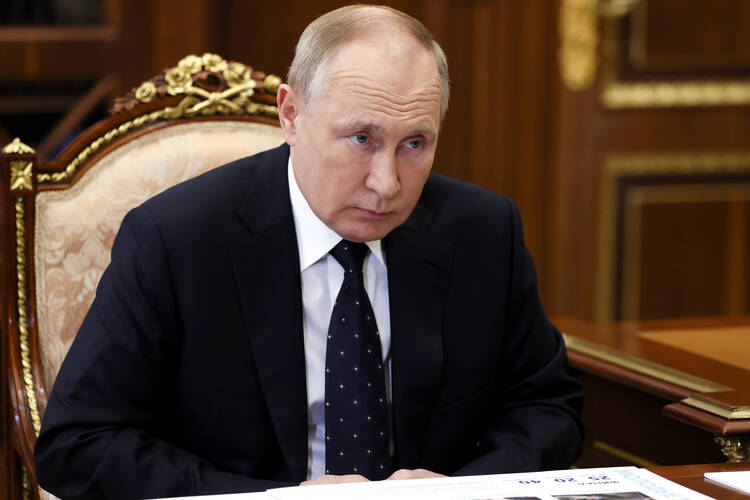For other perspectives on the Ukraine crisis, read “Pope Francis may be our last hope for stopping war in Ukraine” and “10 ways to avoid a devastating war in Ukraine.”
Last fall, Russia began moving troops, tanks and naval vessels to its eastern border with Ukraine and into the Crimean peninsula, which it had annexed by force in 2014. After initial talks with the United States paused on Jan. 13, the Kremlin apparently launched another cyberattack on Ukrainian ministries and is suspected of placing highly destructive malware called “logic bombs” in Ukrainian computer networks, waiting to be triggered. As of mid-January, more train convoys with troops, missiles and tanks are moving west through Russia toward Ukraine. Suddenly it seems like Hungary in 1956 all over again.
These actions by Russian President Vladimir V. Putin are forcing President Biden and our NATO allies in Europe closer to a historic decision: Should we provide military support, including weapons and troops, to Ukrainian forces? For Catholics in particular, there is another question: Would such support be compatible with just war theory?
Should we provide military support, including weapons and troops, to Ukrainian forces? Would such support be compatible with just war theory?
Russia’s aggressive moves against Ukraine began in late 2013, when the Ukrainian president allied with Mr. Putin, Viktor F. Yanukovych, pulled back from joining the European Union and was met with mass protests in Kyiv that drove him from power. Mr. Putin reacted in 2014 by launching massive cyberattacks, sending unmarked troops into the Crimea region of Ukraine, annexing Crimea and fomenting a civil war in Russian-speaking areas of eastern Ukraine that has cost over 14,000 lives. Western nations responded with pinprick economic sanctions, and Germany and France then negotiated the Minsk Protocol, which effectively agreed to Russian control of Crimea and half of the Donetsk and Luhansk provinces of Ukraine.
Now Mr. Putin wants even more: In addition to the territory he has already taken, he wants all of the Donetsk and Luhansk regions and a guarantee that NATO will never admit Ukraine to the alliance. During U.S. Secretary of State Anthony Blinken’s Jan. 21 meeting with the Russian foreign minister, Russia upped the ante even further, demanding that NATO withdraw all forces from Romania and Bulgaria, which are NATO members.
[Related: As a Russian invasion of Ukraine looms, Pope Francis calls for a world day of prayer]
These ultimatums violate just war theory. Rooted in Catholic natural law, just war theory forms the basis of key treaties, including the main documents of international humanitarian law. Six principles are especially relevant in explaining why Russia’s actions toward Ukraine are unjust, and why NATO’s insistence on protecting Ukraine is legitimate according to the same theory.
First, just war theory encourages legitimate governments to form alliances for mutual defense against unjust aggression, and NATO is such an alliance. Note that Russia’s stated goal is to prevent Ukraine from building its strength through alliances. Unlike preventing an imminent attack by another nation, this is never a just goal in war. Mr. Putin’s attempts to stop Ukraine from joining the European Union or NATO are also violations of international law and the United Nations Charter.
Just war theory encourages legitimate governments to form alliances for mutual defense against unjust aggression, and NATO is such an alliance.
Second, just war theory allows legitimate governments and their alliances to respond militarily if negotiation fails to reverse unjust aggressions, such as Russia’s invasion of Crimea and the eastern half of Ukraine’s Luhansk and Donetsk provinces.
Third, wars of conquest are all illegal. Russia’s desire to control Crimea’s ports is a prime example. The victim nation and its allies have just cause to reclaim such losses by force.
Fourth, secession is legitimate only as a last resort to end oppression of the seceding region or minority group. Fomenting civil war without such a just cause, as Mr. Putin has done with separatists in eastern Ukraine, is another crime of aggression.
Fifth, just war theory tells us that while the need to rescue people from atrocities such as ethnic cleansing can be just grounds for military intervention, the fact that a minority group in a given nation no longer controls the national government cannot be used by another nation as a pretext for “rescue.” That was Hitler’s pretext for seizing the majority-German Sudetenland from Czechoslovakia, and Mr. Putin has employed it in his attempts to control parts of Georgia and eastern Ukraine.
Finally, Russia’s repeated cyberattacks on Ukraine from 2014 through 2022, which have cost billions and caused collateral damage in other nations, count as military aggression. A proportionate response from NATO to such attacks need not be only cyber; it could include reprisals that destroy equipment and infrastructure.
To let another Russian tyrant reoccupy any nation in eastern Europe would be a retreat and a betrayal.
We should remember that although many Ukrainians have cultural connections with Russia, many also remember Soviet control with horror, given the Holodomor, or “terror famine” of 1932-1933, when four million Ukrainians died. Ukraine also suffered terribly under German occupation during World War II.
After Soviet control ended in 1991-92, Western allies tried to broker a peace that would protect Ukraine from ever being a victim of Russian aggression again. Ukraine, Russia, the United States and the United Kingdom signed the Budapest Memorandum in 1994, by which Ukraine gave up all the nuclear weapons it retained from Soviet days, handing them over to Russia to be decommissioned in exchange for promises to “respect the Independence and Sovereignty and the existing borders of Ukraine,” to “refrain from the threat or use of force against the territorial integrity or political independence of Ukraine” and “to refrain from economic coercion designed to subordinate to their own interest the exercise by Ukraine of the rights inherent in its sovereignty.” By the end of 2017, Mr. Putin had broken every one of these pledges multiple times.
To let another Russian tyrant reoccupy any nation in eastern Europe would be a retreat and a betrayal. To show our determination on that point, NATO could have admitted Ukraine after the Russian invasions in 2014. NATO and Ukraine might then have negotiated a regional autonomy arrangement, rather than independence, for Crimea and parts of the eastern Ukrainian regions of Donetsk and Luhansk, where ethnic and linguistic affinity with Russia is strongest. This would have required unmarked Russian militias to withdraw and separatists to disarm.
Conversely, delaying Ukraine’s admission to NATO has not deterred Mr. Putin, nor have financial sanctions. And we cannot pretend that Russia has any legitimate grievance here: Mr. Putin’s clear motive for wanting to invade Ukraine is that its people freed themselves from Russian domination and thus have encouraged other liberation movements. Since 2014, Mr. Putin and his foreign puppets have mounted attacks on democratic movements in Venezuela, Moldova, Syria, Belarus, Kazakhstan and of course within Russia itself. Sanctions cannot deter Mr. Putin because he believes his own regime is in danger if democracy spreads.
Trying to appease Mr. Putin any further would endanger more of eastern Europe and encourage him to escalate his assault on democracy. Mr. Biden’s position should be the following: first, he should make it clear that barring Ukraine from NATO is unthinkable; second, if Mr. Putin does not withdraw his forces and return the ships he stole from Ukraine’s navy, we will send offensive arms to Ukraine and press for its immediate entry into NATO; and third, if Russia invades Ukraine again, the United States and our European partners will help Ukraine to repel them.
There is plenty of support in our Senate for allowing Ukraine to join NATO and for sending arms to Ukraine, and the House of Representatives would probably support Biden on these steps as well. Providing military aid to Ukraine to fend off Russian hostility may be necessary for probable success, and it could be done proportionately with the limited goal of driving Russian forces back to the border. But any long-term deployment should come with congressional approval and agreement with our allies. (Authorization by the United Nations Security Council is not needed to aid an ally against aggressive attacks.)
Peace, as the aim of just wars, should not be the false peace of life under tyranny. After years of trying to placate Mr. Putin while he tries to rebuild a Russian empire, and watching him poison his enemies, lock up his political opponents and assassinate journalists, it is time to stand up to his aggressions.







